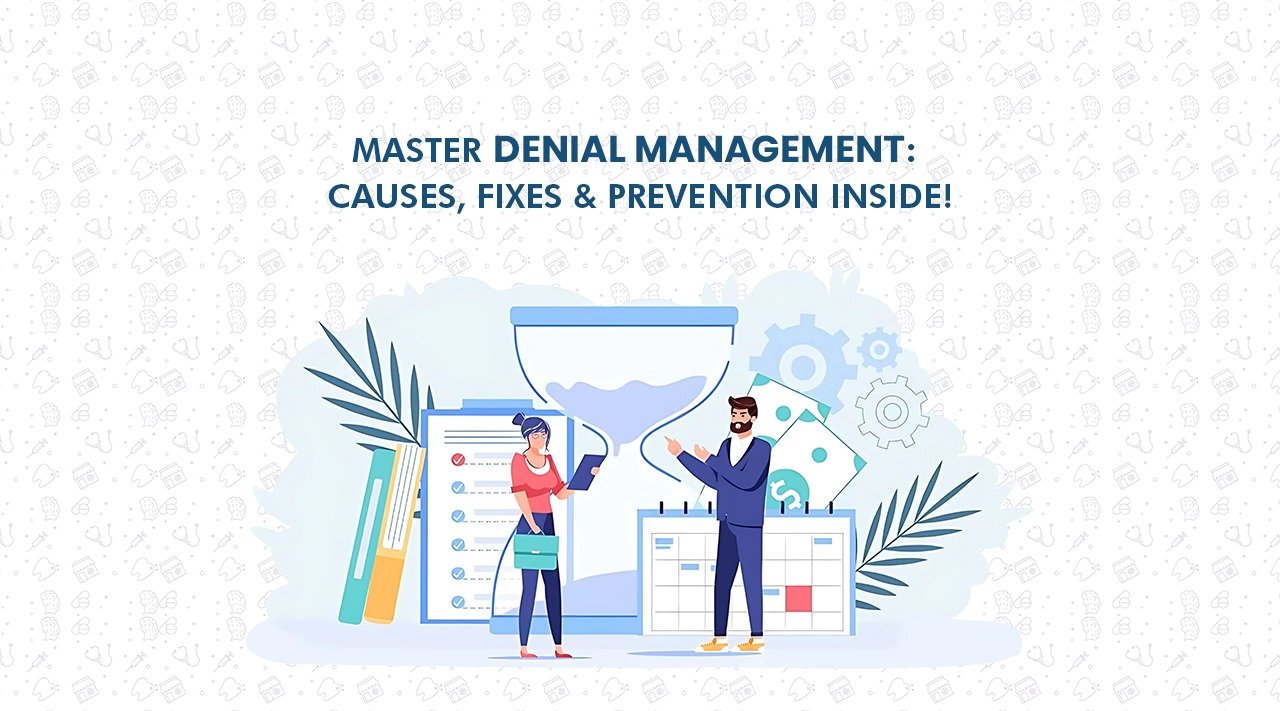Medical billing and Healthcare revenue go hand in hand; however, claim denials can be a significant setback for this duo. This financial setback is mainly due to loopholes in denial management, which need to be fixed to maintain a healthy cash flow. To reduce rejections, you must implement solutions, develop robust rejection strategies, and understand the causes of denials.
Here, we will explain the major causes of denials, best practices for preventing them, and some actionable solutions. Let’s begin by understanding denial management in medical billing.
What is Denial Management in Medical Billing
Denial Management begins with identifying the reasons why insurance claims are denied and then resolving those issues. The final step is to prevent future denials through proactive measures. Furthermore, strong denial management means low administrative costs, quick reimbursements, and improved payer-provider relationships.
Claim Denials Causes
To reduce claim denials in medical billing, it is crucial to understand the causes behind them. Here are the most common ones;
- Incomplete or incorrect patient information
- Submitting claims for ineligible services under the patient’s insurance plan
- Inactive coverage
- Referral errors
- Lack of pre-authorization
- Submitting a duplicate claim
- Using mismatched or incorrect billing codes
- Insufficient documentation to justify the treatment
- Missed claim submission deadlines
Best Solutions for Claim Denials
Healthcare providers and medical billing teams can reduce claim denials efficiently. Here is how;
Implementing an Efficient Claim Denial Tracking System
RCM software and automated billing systems are best for tracking claim denials. You can then further categorize these claims by reason and prioritize following up.
Conducting a Root Cause Analysis
Root cause analysis is quite simple. All you need to do is identify the patterns of denials. For instance, you receive more claim denials due to referral errors; work on that side of the workflow.
Improving Documentation Standards
Ensure that medical records are clear, complete, and accurate. They should also justify the treatment provided.
Train Your Staff Regularly
Your coding teams, medical billing staff, and front desk team should stay updated on coding standards and insurance policies. Make sure they undergo ongoing training.
Keeping a Prompt Follow-up
You can prevent the revenue loss by making timely appeals and submissions. Keep a dedicated team for A/R follow-ups and appeals.
Denial Management | Prevention Strategies
Prevention is the best way to manage denials. Here are the prevention tactics every healthcare provider should know;
- Make sure the patient is insurance eligible before the visit. This will help avoid inconvenience related to coverage exclusions or inactive plans.
- Establish an efficient workflow for referrals and pre-authorizations for diagnostic procedures and high-risk services.
- Implement coding audits and hire certified medical coders to identify errors before claims are submitted.
- Cross-check patient data and advise front desk staff to use standardized forms to ensure accuracy.
Also Read: The Ultimate Guide to Efficient Revenue Cycle Management
How Poor Denial Management Impacts the Finances of a Healthcare Facility
If you are not focusing on denial management, your business can face;
- Delayed payments and inconvenience in smooth cash flows
- Excessive workload and increased administrative costs
- Dissatisfied patients
- Non-recoverable denials leading to lost revenue
Remember that claim denials that are never resubmitted lead to major revenue leakage.
Our Two Cents
Denial management in medical billing doesn’t mean fixing denied claims. Instead, it’s about creating a resilient revenue cycle that prevents issues before they occur. Healthcare facilities can reduce administrative burdens and maximize reimbursements by identifying the major cause of denials, presenting targeted solutions, and implementing effective strategies.
Whether you are a big business or a solo practitioner, RBS Innovators LLC can be your one-stop solution for medical billing issues. Reach out to us today.

